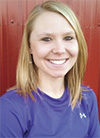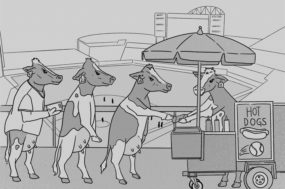I was unloading the dishwasher a few days ago and paused to ponder my husband’s coffee cup. It stuck out like a sore thumb among the other dishes, all scratched and dented, looking like something that belonged in the scrap metal pile rather than the kitchen counter.
I had purchased it for him only a few months ago and was a little irritated he had been so careless with it. “How did he mess it up so quickly?” I thought to myself.
As I reached out to put it away, I was flooded with a sense of remorse for my thoughts when I realized this cup was simply a reflection of how hard this man had worked over the past few months. Not only was this cup scratched and dented from hours of riding in a tractor, being dropped on the barn floor and being run over on a rushed morning when it rolled out of the floorboard of some piece of equipment, one of its most prominent features was: It is a to-go cup.
It had dawned on me – not only did this man work hard, he did so without the luxury of even sitting down to drink his coffee. While at first glance I had considered throwing it in the trash, suddenly I had grown attached to this sorry-looking cup for the job it had done in sustaining the one I love during a busy season. A diamond in the rough, you might say.
This hidden gem of a cup reminds me of a story I heard a while back. I had the privilege of hearing it on a podcast where the host played the actual speech that was recorded in the early 1900s. I wanted to share it with you in hopes one day maybe you can find the time to listen for yourself. The author of the speech is Russell Conwell, a minister, lawyer and writer born in Massachusetts in 1843. He first published the work “Acres of Diamonds” in 1890 but went on to deliver the speech over 6,000 times around the world before he died in 1925.
There are several stories throughout the speech that are quite fascinating, but there is one that stood out to me. It is told to Conwell by an Arab guide as he is traveling down the Tigris and Euphrates River at some time during his young life. The story is about a man named Ali Hafed, a man in ancient Persia that owned a large farm. He was said to be a wealthy and contented man, owning grain fields, orchards and gardens.
One day a priest came to visit, and the two were discussing the intricacies of creation. When the topic of diamonds arose, the priest told Ali Hafed if “he had one diamond the size of his thumb, he could purchase the county, and if he had a mine of diamonds, he could place his children upon thrones.”
Ali Hafed went to bed that night a poor man because of the discontent in his heart. The next day, he asked the priest where he could find these diamonds. Thus, he sold his farm, left his family and journeyed out to search for the thing he did not have. Though with no context as to how long, the story describes Ali Hafed’s search all over the world and his eventual death, still in quest of the white sands that contain diamonds.
Meanwhile, one day the man who had purchased Ali Hafed’s farm was out watering his camel by the river. He saw a flash of light reflecting from the white sand and picked up a peculiar-looking rock. Not thinking much of it, he took it home and placed it on the mantel. The same priest dropped by sometime later and, when he saw a diamond sitting upon the mantel, asked, “Has Ali Hafed returned?” “No,” answered the man.
“That is only a rock we found in the garden.” Upon the priest telling the man he had in fact found a diamond, they rushed to the garden, where they unearthed “the diamond mine of Golconda – the most magnificent diamond mine in all the history of mankind, excelling the Kimberley itself. The Kohinoor and the Orloff of the crown jewels of England and Russia, the largest on earth, came from that mine.”
I’m sure we all have a little different take on the moral of this story. And I’m sure for all of us, our “diamond” might be a different thing. But what a difference perspective makes, especially when times are a little on the tough side. For me, this story reminded me: Although being a dairy farmer sometimes makes life hard for my young family, we wouldn’t trade it for the world. After all, diamonds are formed under pressure. ![]()

-
Laura Flory
- Dairy Producer
- Dublin, Virginia
- Email Laura Flory





